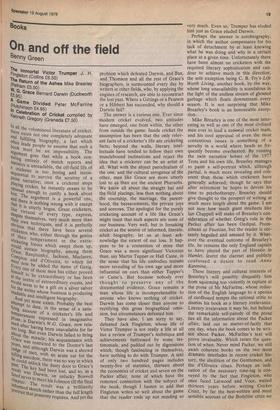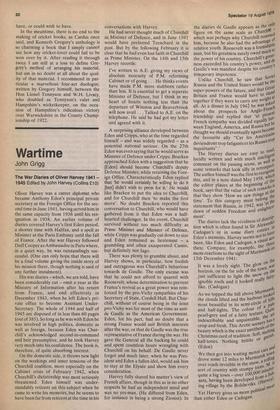Books
On_ and off the field
Benny Green
The immortal Victor Trumper J. H. Fingleton (Collins £6.50) The Return of the Ashes Mike Brearley (Pelham £5.50) W. G. Grace Bernard Darwin (Duckworth £5.95) A Game Divided Peter McFarline (HUtchinson £4.95) In Celebration of Cricket compiled by Kenneth Gregory (Granada £7.50) In all the voluminous literature of cricket, there exists not one completely adequate and fulfilling biography, a fact which Often leads people to assume that such a book must be an impossibility. The argument goes that while a book consisting entirely of match reports and statistics is unreadable, the off-field life of a cricketer is too boring and inconsequential to survive the scrutiny of a Prose narrative; once a cricketer stops Playing cricket, he instantly ceases to be ka,nUstlal enough to justify a book about "mi. The argument is a powerful one, and there is nothing wrong with it except that n is utterly bogus. .Great cricketers, like virtuosi of every type, express, despite themselves, very much more than their own techniques, and it is perfectly obvious
that there have been several cricketers who, either through the genius
E°f their temperament or the extracricketing forces which swept them up, Would sustain biography, among them Urace, Ranjitsinhji, Jackson, Maclaren, °14ton and d'Oliveira, to which list must now be added the name of Greig. himself one of these men has either proved nmself to be extraordinary or has been
at the centre of extraordinary events, and fwould seem to be a gift on a silver salver
..or rite writer whose business is producing readable and intelligent biography.
attempt Yet none exists, Probably the best rfiPt to date, in the sense of a satis
y!tY:ng account of a cricketer's life and :MPerament expressed in imaginative Prose, is Darwin's W.G. Grace, now reisLied after having been unavailable for far `90 long. But even Darwin failed to bring !Pout the miracle; his acquaintance with k.iraee was restricted to the Doctor's last ears, and although Darwin was a shrewd jtnti,d,ge of Men, with an acute ear for the he anecdote, there was no way in which
n could unlock the dusty door to Grace's
Past, The key had been lost, and so, as a result Was Darwin, an unlucky Boswell
erhted never to meet his Johnson till the final "Prer. The result was a brilliantly `2411ortned sketch rather than the full length Portrait that posterity requires. And yet the
problem which defeated Darwin, and Bax, and Thomson and all the rest of Grace's biographers, is surmounted every day by writers in other fields, who, by applying the engines of research, are able to reconstruct the lost past. Where a Gittings or a Pearson or a Hibbert has succeeded, why should a Darwin fail?
The answer is a curious one. Ever since modern cricket evolved, two attitudes have emerged, one from within, the other from outside the game. Inside cricket the assumption has been that the only relevant facts of a cricketer's life are cricketing facts; beyond the walls, literary intellectuals have tended to follow their own musclebound inclinations and reject the idea that a cricketer can be an artist at all. What with the abject parochialism of the one, and the cultural arrogance of the other, men like Grace are more utterly lost to us than are the ancient Pharaohs. We know all about the straight bat' and the field placings, less then nothing about the courtship, the marriage, the parenthood, the bereavements, the private joys and sorrows. The apologist for the purely cricketing account of a life like Grace's might insist that such aspects are none of our business. Very well, but in forsaking cricket as the source of informed, literate, adult biography, let us at least acknowledge the extent of our loss. It happens to be a contention of mine that Grace was a more significant Victorian than, say Martin Tupper or Hall Caine, in the sense that his life embodies truisms more revealing of his own age and more influential on ours than either Tupper's or Caine's. But because nobody ever thought to preserve any of the documented evidence, Grace remains a man whose life is incomprehensible to anyone who knows nothing of cricket. Darwin has come closer than anyone to rectifying this gross biographical omission, but circumstances defeated him.
They have also, I am sorry to say, defeated Jack Fingleton, whose life of Victor Trumper is not really a life at all but a review of Trumper's technique and achievements buttressed by some testimonials, and padded out by digressions which, though fascinating in themselves, have nothing to do with Trumper. A text of only two hundred pages includes twenty-five of statistics, thirteen about the economics of cricket and seven on the Packer affair, none of which have the remotest connection with the subject of the book, though I hasten to add that Fingleton writes so well about the game that the reader ends up not minding so very much. Even so, Trumper has eluded just ust as Grace eluded Darwin.
. Perhaps the answer is autobiography, in which the author compensates for his lack of detachment by at least knowing what he was doing and why in a certain place at a given time. Unfortunately there have been almost no cricketers with the required literary sophistication and candour to achieve much in this direction, the sole exception being C. B. Fry's Life Worth Living, another book, by the way, whose long unavailability is scandalous in the light of the endless stream of ghosted garbage which floats downstream every season. It is not surprising that Mike Brearley's book is an honourable exception.
Mike Brearley is one of the most interesting as well as one of the most civilised men ever to lead a national cricket team, and his cool appraisal of even the most contentious issues is something of a novelty in a world where heads so frequently become overheated. By running the twin narrative horses of the 1977 Tests and his own life, Brearley manages to paint a self-portrait which, although partial, is much more revealing and coherent than those which cricketers have generally achieved; though he says that after retirement he hopes to devote his time to psychotherapy, Brearley should give thought to the prospect of writing at much more length about the game. I am not sure how much giant intellects like Ian Chappell will make of Brearley's consideration of whether Greig's role in the Packer affair has been Oedipal, Promethean or Faustian, but the reader is certainly beguiled and amused by it. Whatever the eventual outcome of Brearley's life, he remains the only England captain to have played the part of Horatio in Hamlet, learnt the clarinet and publicly confessed a desire to read Anna Karenina.
These literary and cultural interests of Brearley's will possibly disqualify him from squirming too violently in rapture at the prose of Mr McFarline, whose reduction of the English language to a species of cardboard tempts the rational critic to dismiss his book as a literary irrelevance. Literary irrelevance it may be, but behind the remarkable self-parody of the prose lies all the information about the Packer affair, laid out so matter-of-factly that one day, when the book comes to be written about Packer, McFarline's text will prove invaluable. Which raises the question of when. Never mind Packer, we still await coherent books on the two most dramatic interludes in recent cricket history, the abolition of the Gentlemen, and the d'Oliveira crises. Perhaps an indication of the necessary time-lag is conveyed by the fact that Fingleton, who once faced Larwood and Voce, waited thirteen years before writing Cricket Crisis, by far the best-written and most sensible account of the Bodyline crisis we
have, or could wish to have.
In the meantime, there is no end to the making of cricket books, as Cardus once said, and Kenneth Gregory's anthology is so charming a book that I simply cannot see how any cricket-lover could fail to be won over by it. After reading it through twice I am still at a loss to define Gregory's method of arranging his material, but am in no doubt at all about the quality of that material. I recommend in particular a marvellous four-act duologue, written by Gregory himself, between the Hon Lionel Tennyson and W.H. Liysey, who doubled as Tennyson's valet and Hampshire's wicketkeeper, on the occasion of Hampshire's ridiculous victory over Warwickshire in the County Championship of 1922.



































 Previous page
Previous page